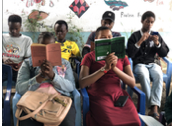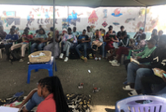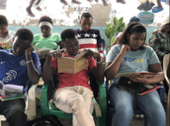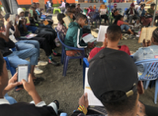Interestingly, this proverb contrasts with another English proverb "Too many cooks spoil the broth." As my dad pointed out, "It's 'many hands make light work'... not 'many hands make right work!'"
While the origins of the proverb are unclear, it appears in John Heywood's collection of English Proverbs (1546), where he attributes it to the didactic poem How the Good Wife Taught her Daughter (late 1300s), a didactic poem that reminds me of Utendi wa Mwana Kupona.
Similar proverbs:
Kiswahili
Mikono mingi kazi haba
Many hands, small work
Chinese:
人多好辦事
Many people, fine work
Russian:
берись дружно, не будет грузно
Take hold of it together, it won't be heavy























